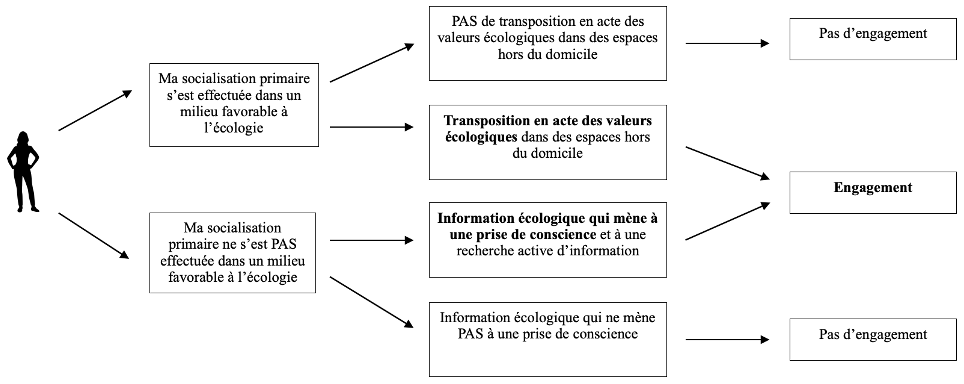
When does engagement begin for youth?
Defining an “engaged person” is not easy… That’s why we asked young people to tell us about it. Most notably, they mentioned the origin of their commitment.
For example, do you think it is absolutely necessary to have grown up in a family that is aware of environmental issues to become involved in this field yourself?
OUI
You grew up in a family aware of environmental issues. You have developed, through your contact with your parents, perhaps also with your siblings, ecological values that nurture your sensitivity to environmental issues.
NON
Tout à fait ! Des personnes qui n’ont pas grandi dans des familles sensibilisées aux enjeux environnementaux sont aujourd’hui très engagées dans ce domaine. Les résultats de notre enquête vous montreront pourquoi…
The people engaged in ecology, who we spoke to for our survey, allowed us to identify two paths leading to commitment to the environmental protection field.
Path 1
You grew up in a family aware of environmental issues. You have developed, through your contact with your parents, perhaps also with your siblings, ecological values that nurture your sensitivity to environmental issues.
What is Environmental Sensitivity?
“According to Chawla (1998), environmental sensitivity is a predisposition to ‘have a taste for learning’ about the environment, to ‘feel concerned’ by this environment and to ‘act’ to preserve it on the basis of significant experiences. It is a form of participation in the environment and in its emotions. It is, in a way, an empathetic perspective towards the environment; a “predisposition to take responsible environmental action” (in Gravel & Pruneau, 2004). (in Gravel & Pruneau, 2004)
Find out more about the work of the American psychologist Louise Chawla

In sociology, we thus speak of primary socialization. Certain daily actions which, from the outside, can be described as eco-responsible, such as sorting waste, are in reality actions, which you perceive as normal… To you, the commitment starts when you transpose your ecological values outside of the family framework, for example at school, in the workplace, with friends…
Path 2
Your family is not particularly sensitive to environmental issues. Ecological values were not ingrained in you by your parents. Perhaps, environmental issues were even far removed from your concerns. It is something outside of the family that may have raised your an awareness… It could be a friend, participating in an activity, taking part in a protest, but perhaps also the discovery of information gathered online, watching a video on a social network or a testimony found online, which is the origin of your awareness. This information may even have triggered in you an “instant” awareness of the ecological or social situation. Unlike the first type of journey, the engagement begins here, with the active search for information and not with the enactment of ecological values.
Of course, these two courses are not totally distinct. For some people, engagement can take shape through a hybridization of the two models.
A diagram below summarizes young people’s paths:
Diagram: My primary socialization took place in an environment favourable to ecology.

Diagram: My primary socialization took place in an environment favourable to ecology.
– NO transposition into action of ecological values in spaces outside the home.
– Transposition into action of ecological values in spaces outside the home.
– No engagement.
– Engagement.
My primary socialization was NOT carried out in an environment favourable to ecology.
– Ecological information that leads to awareness and an active search for information.
– Ecological information that does NOT lead to awareness.
– No engagement.
Ultimately, it is not necessary to have grown up in a family sensitive to these environmental issues to become involved environmental protection. The proof is that many young people have already taken this second path. However, whether in the case of young people who have benefited from awareness on environmental issues within the family or of others who have not experienced this situation, it is through taking action that the feeling of being involved develops, either by acting outside the family space, or by becoming more informed about it.
For further information
- Becquet, 2016, « Le service civique : un choix d’engagement inscrit dans les parcours juvéniles », Informations sociales – 4 (n° 195). En ligne ici
- Léger Michel T. & Pruneau Diane, 2015, « Vers l’adoption de comportements environnementaux dans la famille – Perspectives théoriques », Éducation relative à l’environnement, Volume 12. En ligne ici
- Pleyers, G., & Capitaine, B. (2016) « Introduction. Alteractivisme : comprendre l’engagement des jeunes », Agora débats/jeunesses 2016/2 (N° 73), p. 49-59. En ligne ici.
- Ojala Maria, 2012, « Hope and climate change: the importance of hope for environmental engagement among young people ». Lien vers le résumé ici
